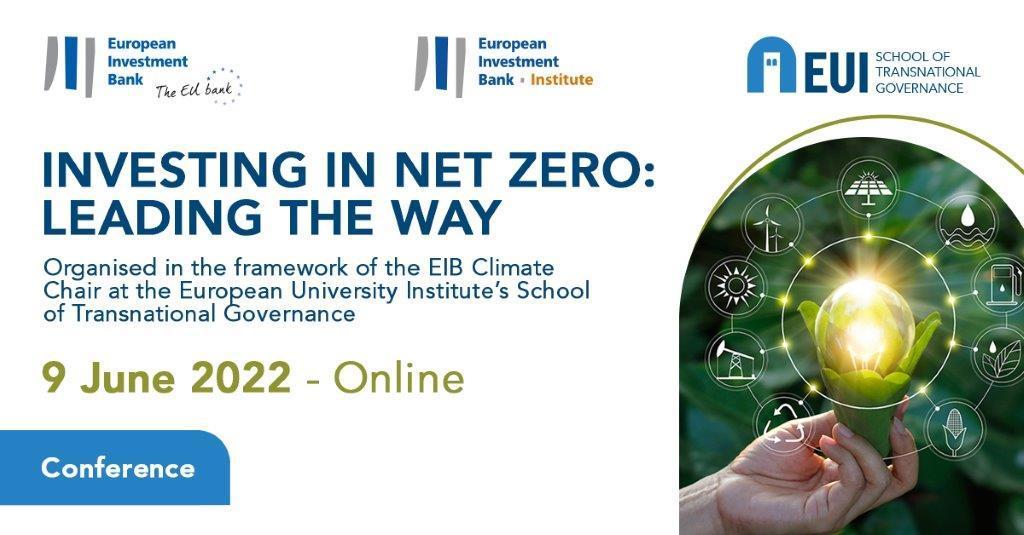
- Leading experts from finance, industry, government and civil society will convene in Luxembourg
- Themes include the energy transition, innovation and how to make the United Nations COP27 climate conference a success
- Conference takes place on 9 June at 14.00 (CET) in hybrid format
On 9 June 2022, the European Investment Bank (EIB), together with the EIB Institute and European University Institute (EUI), is organising the conference Investing in Net Zero: Leading the Way to discuss investments needed to attain net zero emissions and the European Union’s global leadership in mobilising the necessary climate finance. The event programme and registration are available here.
Speakers include Minister of International Cooperation of the Arab Republic of Egypt Rania Al-Mashat, EIB Vice-President Ambroise Fayolle, Director of the EUI School of Transnational Governance Alexander Stubb, Chief Executive Officer and General Manager of Enel Francesco Starace, and Chairman and Chief Executive Officer of Liebreich Associates Michael Liebreich.
The discussions will explore the best practices in the areas of a global just energy transition and innovation in new technologies that will determine the success of this make-or-break decade for climate change. The conference will also feature a special session on the upcoming COP27 in Egypt, which represents a pivotal moment for international climate negotiations, with issues like sustainable finance coming to the forefront. This session will provide insights into the key themes of COP27 and will discuss how financiers, businesses, policymakers and scientists can come together to make the best possible contributions and ensure COP27 is a success.
The conference is organised in the framework of the EIB Climate Chair at the European University Institute’s School of Transnational Governance.
EIB Vice-President Ambroise Fayolle commented: “The COVID-19 pandemic and Russia’s war against Ukraine are a human tragedy and impact global energy and food security. Both crises also have significant consequences for the global fight against climate change. This conference we are hosting with the European University Institute presents an important opportunity to take stock and discuss how businesses, cities, governments and financial institutions can collectively accelerate their support for a just energy transition, drive innovation in new technologies and support the successful outcome of the COP27 climate conference. I want to thank our partners at the European University Institute for the excellent cooperation in promoting best climate policy practices across the world.”
H.E. Dr. Rania A. Al-Mashat, Egypt’s Minister of International Cooperation said: “The main objective of the COP27 climate conference in Egypt later this year will be to move from pledges to implementation. However, global climate financing is significantly lower than needed, and is also unevenly distributed, with Africa receiving less than 5.5%. Hence, innovative solutions, such as de-risking instruments and blended finance, are therefore more important than ever in attracting investment for green, sustainable, inclusive, and resilient development – particularly within developing countries and emerging economies. This requires multi-stakeholder engagement, including cooperation between governments, multilateral development banks, and the private sector.”
Professor Alexander Stubb, Director of the School of Transnational Governance said: “Climate change is a defining challenge of our time, which will impact generations to come. It is even more crucial to step up efforts in light of the ramifications of the war in Ukraine. We are delighted to partner with the European Investment Bank to discuss concrete steps on the energy transition and innovation in a joint conference, building among others on the excellent research by the EIB Climate Chair team at the EUI’s School of Transnational Governance.”
Professor Jos Delbeke, the European University Institute’s EIB Chair on Climate Change Policy and International Carbon Markets added: “My team brings together the best talents for research and teaching in support of climate innovation and a just energy transition around the world. We work closely with our partners at the European Investment Bank to inform policymaking on climate change. This conference will allow us to take discussions on climate finance, the energy transition and innovation further and to prepare for the successful outcome of COP27 later this year.”
If you are interested in interviewing EIB Vice-President Ambroise Fayolle, School of Transnational Governance Director Professor Alexander Stubb, Professor Jos Delbeke or EIB experts, or would like to receive additional information, please get in touch.
Background information
The European Investment Bank is active in around 160 countries and is the world’s largest multilateral lender for climate action projects. The EIB Group has adopted its Climate Bank Roadmap to deliver on its ambitious agenda to support €1 trillion of climate action and environmental sustainability investments in the decade to 2030 and to deliver more than 50% of EIB finance for climate action and environmental sustainability by 2025. As part of the roadmap, all new EIB Group operations have been aligned with the goals and principles of the Paris Agreement since the start of 2021.
The EIB Institute was set up within the EIB Group (European Investment Bank and European Investment Fund) to promote and support social, cultural and academic initiatives with European stakeholders and the public at large. It is a key pillar of the EIB Group’s community and citizenship engagement.
The European University Institute (EUI) is an international postgraduate teaching and research institute based in Florence, Italy. It was founded in 1972 by the six founding Member States of the European Communities and today is supported by 23 contracting states from the European Union. The EUI offers PhD and postdoctoral programmes in Economics; Political and Social Sciences; History; and Law, and is home to the Robert Schuman Centre for Advanced Studies and the School of Transnational Governance. www.eui.eu
The EUI School of Transnational Governance was established in 2017 to provide excellent training on policymaking beyond the state. It offers executive training for professionals and a Master’s in Transnational Governance; organises high-level policy dialogues; and hosts Policy Leader Fellows and Young African Leaders Fellows. The European Digital Media Observatory (EDMO) is based at the School of Transnational Governance.